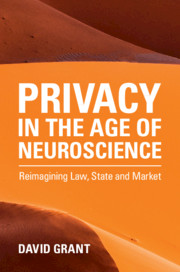1 - Introduction
Published online by Cambridge University Press: 09 April 2021
Summary
This work will address the problems of contemporary accounts of privacy by placing them in a new context of the mythological social dynamic that has constrained the West. This dynamic has driven a trajectory of failed mythological magnitudes – Deity, State, Market and now Technology – by which we have tried to avoid existential reality rather than embrace it. This avoidance is why privacy is vulnerable to the imminent impact of the latest form of that dynamic, neuroscience: while ‘privacy’ comes from early forms of this dynamic, neuroscience is now its most powerful form and will overwhelm that sense of privacy. Privacy needs to be removed from this dynamic, reconceiving it through existential, respectful self-responsibility. It will then survive this challenge and will, counterintuitively, embrace neuroscientific benefits, including their promotion of this new privacy through the technological control of the citizen. We will examine the dynamic, how it produced present notions of privacy through a singular form of normalisation, and how it is being re-formed by the mythological algorithms of neuroscience. To disengage privacy, we will need new ethical principles and reimagined social infrastructure – law, State and Market, these best understood by reconceiving regulation. That will provide the necessary support for self-responsibility.
Keywords
- Type
- Chapter
- Information
- Privacy in the Age of NeuroscienceReimagining Law, State and Market, pp. 1 - 22Publisher: Cambridge University PressPrint publication year: 2021

